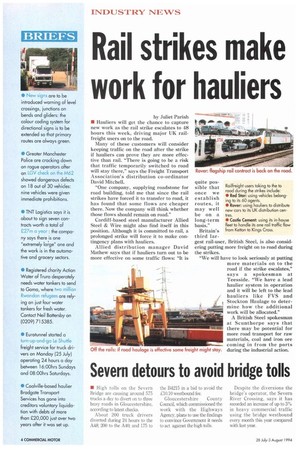Rail strikes make work for hauliers
Page 6

If you've noticed an error in this article please click here to report it so we can fix it.
by Juliet Parish • Hauliers will get the chance to capture new work as the rail strike escalates to 48 hours this week, driving major UK railfreight users on to the road.
Many of these customers will consider keeping traffic on the road after the strike if hauliers can prove they are more effective than rail. "There is going to be a risk that traffic temporarily switched to road will stay there," says the Freight Transport Association's distribution co-ordinator David Mitchell.
"One company, supplying roadstone for road building, told me that since the rail strikes have forced it to transfer to road, it has found that some flows are cheaper there. Now the company will think whether those flows should remain on road."
Cardiff-based steel manufacturer Allied Steel & Wire might also find itself in this position. Although it is committed to rail, a prolonged strike will force it to make contingency plans with hauliers.
Allied distribution manager David Mathew says that if hauliers turn out to be more effective on some traffic flows: "It is quite possible that once we establish routes, it may well be on a long-term basis."
Britain's third largest rail-user, British Steel, is also considering putting more freight on to road during the strikes.
"We will have to look seriously at putting more materials on to the road if the strike escalates," says a spokesman at Teesside. "We have a lead haulier system in operation and it will be left to the lead hauliers like FVS and Stockton Haulage to determine how the additional work will be allocated."
A British Steel spokesman at Scunthorpe says that there may be potential for more road transport for raw materials, coal and iron ore coming in from the ports during the industrial action.




































































































